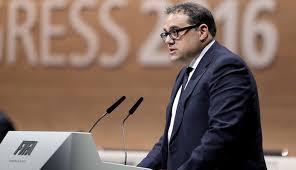October 20 – FIFA says it has struck a deal which it hopes will lead to world players’ union FIFPro withdrawing a legal complaint against the transfer system at the European Commission (EC).
But FIFPro takes a different view saying it is “premature” to talk about dropping the complaint which it lodged in 2015 arguing that the system was anti-competitive and illegal.
FIFA’s stakeholders’ committee said after a meeting on Thursday that it had reached an agreement which would make it easier for players leave their clubs if they were not being paid on time.
“It was an issue that was stewing for a long, long time and they couldn’t come to an agreement, but because of our impetus they’ve reached one,” Canada’s Victor Montagliani (pictured), head of the committee, told reporters. “We all like to get paid…it’s an employment labour issue and to me that’s very important.”
FIFA said that, in return, FIFPro had agreed that it would withdraw its legal complaint which, if successful, could cause the biggest upheaval to the sport since the Bosman ruling in 1995.
FIFPro said talks were constructive but insists the payments issue is only a small part of the overall picture. It argues transfer fees are a tax on employment and constitute restrain trade so should be deemed illegal. If the European Commission agrees and orders transfer fees to be halted, the game would suffer its biggest upheaval since Bosman.
“It’s premature to discuss what might happen next regarding our legal complaint against the transfer system, or any prospective deal until we are satisfied with the proposals put forth,” a FIFPro statement said.
Meanwhile FIFA is reported to be considering changing the rules which govern players’ eligibility for national teams, including a proposal which would allow them to switch allegiance under certain circumstances.
At present, players who have played a competitive international for one team cannot switch to another even when they hold dual nationality. Also players are only allowed to represent a country with which they have no connection if they have lived and played there for five years but this could in future be extended.
“There are nationality issues that pop up all over the world, in Africa, there are issues in Asia and CONCACAF, so it’s a good time to have a look at this and see if there are solutions, without hurting the integrity of the game,” said Montagliani.
Contact the writer of this story at moc.l1713531115labto1713531115ofdlr1713531115owedi1713531115sni@w1713531115ahsra1713531115w.wer1713531115dna1713531115

